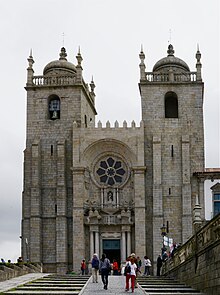Oporto Cathedral
| Sé do Porto Cathedral of the Assumption of Our Lady |
|
|---|---|

Façade of the Porto Cathedral
|
|
| Basic information | |
| Location | Porto, Portugal |
| Geographic coordinates | 41°08′34″N 8°36′41″W / 41.1428°N 8.6113°WCoordinates: 41°08′34″N 8°36′41″W / 41.1428°N 8.6113°W |
| Affiliation | Roman Catholic |
| District | Porto District |
| Province | Douro Litoral Province |
| Country | Portugal |
| Ecclesiastical or organizational status | cathedral |
| Architectural description | |
| Architectural type | Church |
| Architectural style | Romanesque, Gothic, Baroque |
| Completed | 1737 |
The Porto Cathedral (Portuguese: Sé do Porto) is a Roman Catholic church located in the historical centre of the city of Porto, Portugal. It is one of the city's oldest monuments and one of the most important local Romanesque monuments.
The current Cathedral of Porto underwent construction around 1110 under the patronage of Bishop Hugo and was completed in the 13th century, but there is evidence that the city has been a bishopric seat since the Suevi domination in the 5th-6th centuries.
The cathedral is flanked by two square towers, each supported with two buttresses and crowned with a cupola. The façade lacks decoration and is rather architecturally heterogeneous. It shows a Baroque porch and a beautiful Romanesque rose window under a crenellated arch, giving the impression of a fortified church.
The Romanesque nave is rather narrow and is covered by barrel vaulting. It is flanked by two aisles with a lower vault. The stone roof of the central aisle is supported by flying buttresses, making the building one of the first in Portugal to use this architectonic feature.
This first Romanesque building has suffered many alterations but the general aspect of the façade has remained romanesque.
Around 1333 the Gothic funerary chapel of João Gordo was added. João was a Knight Hospitaller who worked for King Dinis I. His tomb is decorated with his recumbent figure and reliefs of the Apostles. Also from the Gothic period is the elegant cloister, built between the 14th and the 15th centuries during the reign of King John I, who married English Princess Philippa of Lancaster in Porto Cathedral in 1387.
...
Wikipedia
